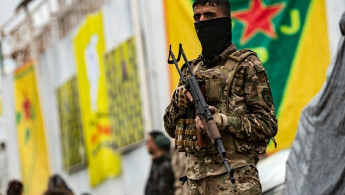Turkey announces assassination of prominent Syrian Kurdish commander Sherwan Hassan
Turkish authorities announced on 17 December that they had assassinated Sherwan Hassan, a prominent Kurdish commander, in northeastern Syria in a continuation of its targeting of the Syrian Kurdish leadership.
Hassan, who helped found the Kurdish Self Defense Forces (HXP) in northeast Syria and was a member of the Deir az-Zour military council, was killed by an explosive device on 5 December after leaving a meeting with the international coalition to defeat the so-called Islamic State (IS).
In a statement after his death, the US-backed, Kurdish-led Syrian Democratic Forces (SDF) said that Hassan had a "pivotal role" in the organisation after IS was defeated and that he was a "clear target for hostile parties that do not want good for the region."
The Turkish National Intelligence Organisation (MIT) was responsible for the assassination of Hassan in Deir az-Zour, according to Anadolu Agency.
His assassination as Turkey carries out an intensified campaign against the SDF since a government building was bombed in Ankara on 1 October, which Turkey blamed on the Syrian group.
Turkey has since carried out extensive bombing on northeast Syria, hitting civilian infrastructure and killing 48, nine of whom were civilians, according to Qamishli-based Rojava Information Center.
Turkey views the SDF as an outgrowth of the Kurdistan Workers' Party, with which it has waged a 40-year-long civil war. It has pledged to push the Syrian Kurdish group away from its southern border.
In a November report, Human Rights Watch (HRW) said that Turkey appears to have "repeatedly failed to take necessary precautions to avoid civilian casualties" in its military operations in northeastern Syria.
Hassan's assassination is the latest in a string of Turkey's decapitation strategy, targeting high-ranking SDF officials.
Though the SDF lauded the Kurdish leader's "pivotal role" in the organisation, analysts said his loss would not substantially impact the group.
"While each leader imparts some influence, the SDF operates in a manner that mitigates the effects of losing commanders. They possess the capability to promptly replace them," Abdulla Hawez, a Syria and Middle East geopolitical analyst, told The New Arab.
Perhaps more significant than the assassination of the SDF itself is the fact that it took place in Deir az-Zour. The SDF has had consistent governance problems in Deir az-Zour, where Arab tribes have long complained of marginalisation under SDF rule.
Simmering resentment exploded into open conflict in late August when the arrest of a leader of the local Deir az-Zour military council led Arab tribes to lead a mutiny against the SDF. Tribal fighters launched an offensive against the Syrian Kurdish group, seizing control of several towns in the northeastern province.
The SDF managed to put down the rebellion, though sporadic battles have occurred since.
Fighting between the SDF and Arab tribes in Deir az-Zour has been fueled by various actors, including the Syrian regime and Iran, who have sheltered and armed tribal leaders.
"The recent reports of Turkish intelligence's involvement in the assassination of an SDF commander are a potentially new development, as Turkish activities were in [Deir az-Zour] not previously widespread," Hawez said.
"With tribal forces now openly hostile to the SDF, it is only logical for Turkey to offer support," he added.





 Follow the Middle East's top stories in English at The New Arab on Google News
Follow the Middle East's top stories in English at The New Arab on Google News


